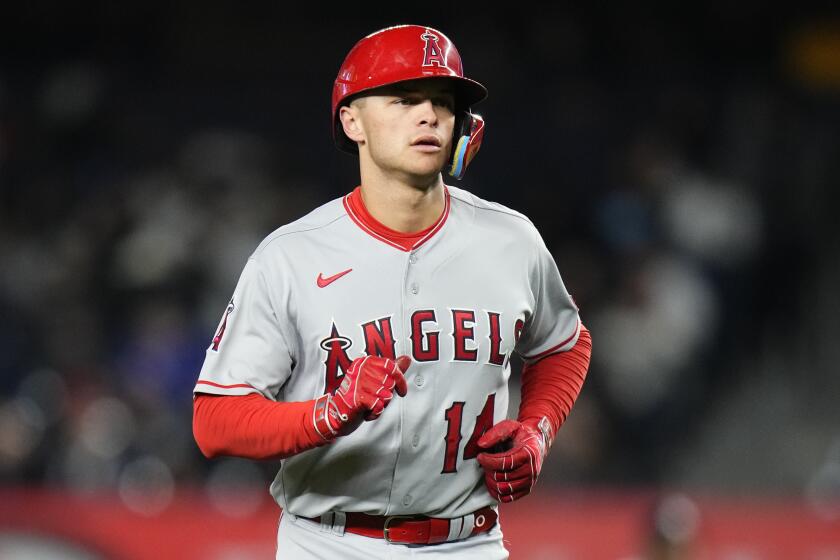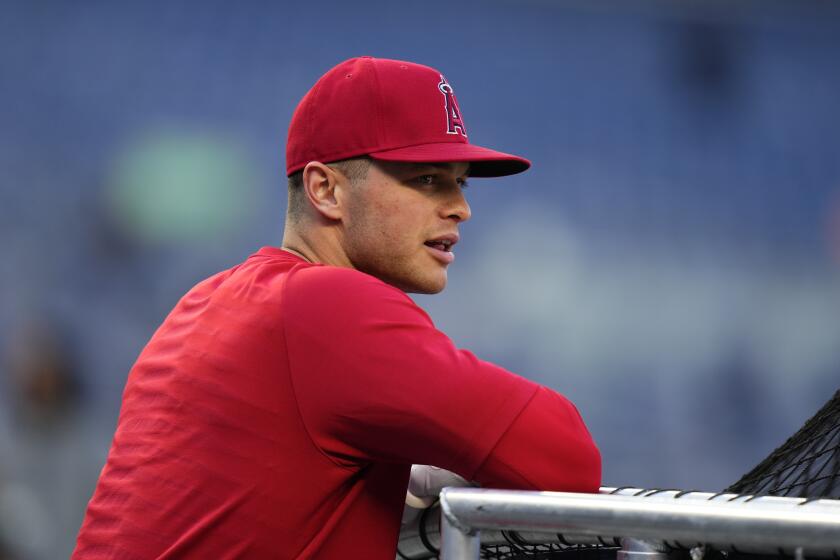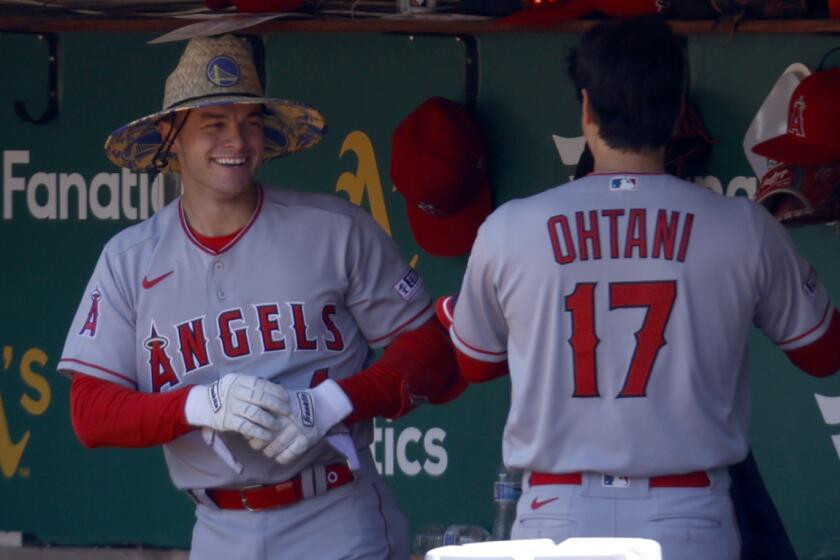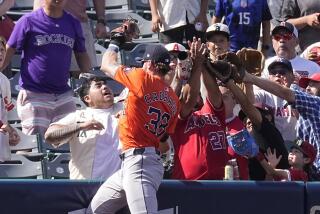How injured Angels catcher Logan O’Hoppe’s ‘different perspective’ will help his career

- Share via
Logan O’Hoppe has been making the most of his time on the injured list.
When he’s not doing his rehab work, O’Hoppe is still present. He arrives at the clubhouse with everyone else, is on the plane traveling for every road series, attends team meetings and is in the Angels dugout during every game.
The Angels’ 23-year-old rookie catcher is on the IL, recovering from surgery to repair the torn labrum in his left shoulder. But in the wake of the most significant injury of his career, he has also been using the time to learn and observe the game in a way he never has before.
“It’s like, you take the physical stuff out of the game,” O’Hoppe said. “That’s the biggest worry when you’re in it, is getting through it physically and playing well, but I don’t have to worry about that right now. So this is an interesting perspective and I’ve learned a lot.”
Of course, O’Hoppe would rather be playing — he played in 16 of the Angels’ first 19 games this season, batting .283 with four homers and 13 RBIs and an .886 OPS. But after learning he’d be down a while, he planned on making this period of his career as productive as possible.
Angels catcher Logan O’Hoppe has been diagnosed with a torn labrum in his left shoulder and will have surgery to repair the injury this week.
“I definitely planned on making the most of it when I went down, so that’s what I’ve been continuing to do,” O’Hoppe said. “Don’t get me wrong, if I had the choice to do this or play, my choice would be to play. But these cards were dealt, so I just gotta play the hand.”
O’Hoppe continues to learn and get direction from the coaches in game planning, but the people he has been leaning on are the Angels’ other catchers, Chad Wallach and Matt Thaiss.
While sitting in the dugout watching a game, O’Hoppe will ask whoever isn’t playing that day questions about what to do in certain situations, getting to talk through his thought processes in game time.
“It could be anything,” Thaiss said, “I’d say 98% of the time [his questions are] about the game, the other 2% it’s just messing around with some stuff.”
Added Wallach: “He’ll sometimes give me a, ‘Hey, what would you throw here?’ Or, ‘Hey, this is what I would call, what are your thoughts?’ Even if I would have thrown something different, it’s always more like a ‘OK, tell me why you would throw that?’ And there’s usually a good reason for it.
“It just shows how much he wants to learn and how quickly he wants to pick up on things and get better even when he’s down with an injury like this.”
A lot of O’Hoppe’s questions have also been about navigating a game with the new rules, like the pitch clock. For example, how to help get pitchers a few extra seconds to recuperate, when are the best moments to go out to chat with the pitchers or how to help slow down a game a bit.
O’Hoppe writes those notes down on the back of his own charts.
New York native Logan O’Hoppe grew up as a Yankees fan, and now he’ll be able to play in a stadium that holds a special meaning to him and his family.
“There’s not something I’m really looking for,” O’Hoppe said. “I’m going into it open-minded and just observing and then when something comes up, I’ll jot it down.”
O’Hoppe has been healing and progressing well since having surgery on April 25 after getting hurt five days prior to playing against the Yankees. The expected timeline on his return is four to six months.
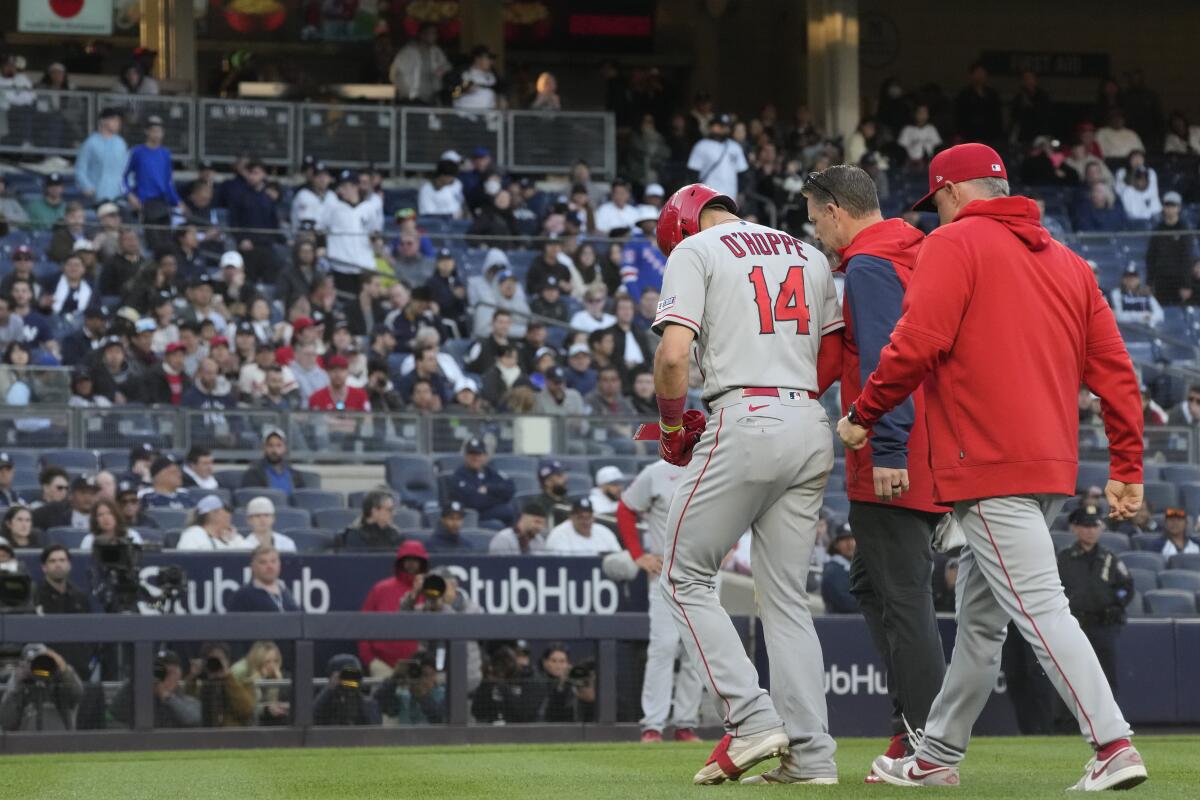
He had some pain, but in his elbow, for the first two days post-operation, mostly because he was still adjusting to the fixed position his arm was in in the sling. He was in a sling regularly for three weeks, needing to continue wearing it while sleeping for an additional three weeks after that, but was back to normal at the beginning of June.
“Little wins are huge,” O’Hoppe added. “At first it was being able to brush my teeth with my left hand, now it’s being able to [jog on the track].”
O’Hoppe’s physical therapy exercises have gradually increased, working with doctors and trainers who’ve set certain checkpoints in his recovery. As he continues checking off the boxes, he’s still hoping his return happens closer to the four-month mark.
“Every time we progress with something that’s an exercise and I say I’m good to go, there’s no second thought in the back of my head that I’m not ready for it,” O’Hoppe said. “I’ve been feeling pretty confident about it.
“I’m being cautious and smart with it, but they told me four to six months from the start,” he continued, “So I don’t want to wait six months. I mean, if they tell you you can do it in four, I’m gonna do it in four.”
Logan O’Hoppe is facing a tough task as a rookie catcher for the Angels. The team has high hopes that he will develop into a standout player.
The next phase in O’Hoppe’s physical therapy will be adding more weight and repetitions to his lifting regimen. He’s already been able to get in his stance and lift a bat to track pitches off the machine, though he is not able to start swinging yet and has not progressed to doing full baseball activities.
“It’s a learning experience for him,” Angels manager Phil Nevin said. “He’s killing it in his rehab, he’s above and beyond. We gotta throttle him back every day, but he’s moving along, progressing great.”
Nevin said last week it’s still too early to tell whether O’Hoppe will come back around the four-month mark, which would be in August.
O’Hoppe will continue to make his strides and when he eventually returns, he hopes all of his observations will make him a better catcher for it.
“As far as seeing the game from a different lens,” O’Hoppe said, “I think it’s going to be super helpful going forward with game planning and working with pitchers. Excited to use what I’ve learned.”
More to Read
Go beyond the scoreboard
Get the latest on L.A.'s teams in the daily Sports Report newsletter.
You may occasionally receive promotional content from the Los Angeles Times.

